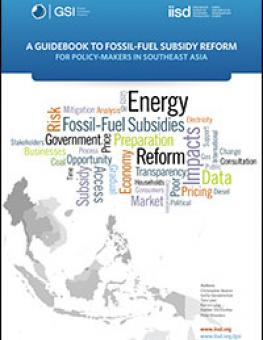
A Guidebook to Fossil-Fuel Subsidy Reform for Policy-Makers in Southeast Asia
There is no one-size-fits-all strategy for fossil-fuel subsidy reform—but there are a set of planning stages that are generic, along with many common issues, challenges and potential solutions.
The purpose of this guide is to advise countries on the process for formulating an effective reform strategy that will fit their individual objectives and circumstances. It is aimed at policy-makers in Southeast Asia, but much of its guidance could apply to any region.
The guidebook draws together the experience that countries around the world have developed to prepare for fossil-fuel subsidy reform. It provides guidance on the pacing of reform as well as identifying good practice across three core elements:
- Getting the prices right: how to change pricing systems for fossil fuels
- Managing the impacts: estimating effects of reform and mitigating unwanted impacts
- Building support: internal organization and external consultation and communication
You might also be interested in
Heatwaves to hit China once every 5 years as global extreme weather events multiply, study finds
Record-breaking heatwaves that have scorched North America, Europe and China are set to worsen in future unless the world stops burning fossil fuels, according to a study by the World Weather Attribution (WWA) academic initiative.
What the war in Ukraine means for Asia's climate goals
The queues outside petrol pumps in Sri Lanka have lessened, but not the anxiety. Asanka Sampath, a 43-year-old factory clerk, is forever vigilant. He checks his phone for messages, walks past the pump, and browses social media to see if fuel has arrived. Delays could mean being left stranded for days. "I am really fed up with this," he said. His frustrations echo that of the 22-million inhabitants of the island nation, facing its worst ever economic crisis because of heavy debts, lost tourism revenue during the pandemic, and surging costs. The consequent political turmoil culminated with the formation of a new government, but recovery has been complicated by Russia's invasion of Ukraine, and the consequent upending of global energy markets.
A Forum for South East Asian Policy-Makers on Fossil-Fuel Subsidy Reform: Challenges and opportunities - Meeting Report
Reforming Environmentally Harmful Subsidies
This playbook offers a strategic framework for philanthropic organizations to understand, engage, and advance environmentally harmful subsidies reform as a critical avenue for sustainable environmental and economic transformation.